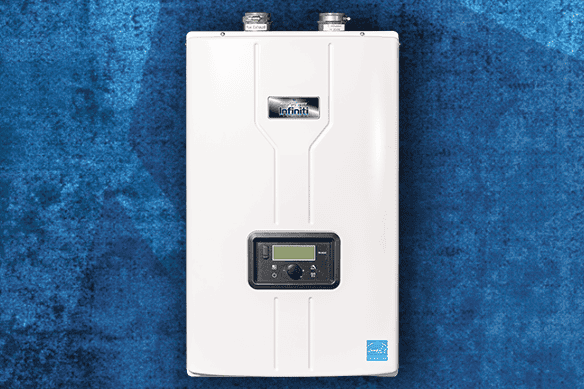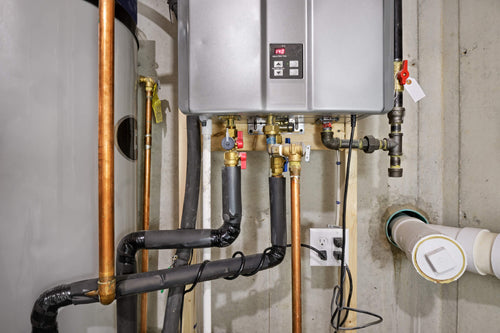The Road To Gaining The Benefits Of Tankless Water Heaters
The Road To Gaining The Benefits Of Tankless Water Heaters
Blog Article
We have noticed the article relating to Why You Should Consider a Tankless Water Heater below on the internet and figured it made sense to relate it with you on this site.

In a globe where benefit and effectiveness reign supreme, it's no surprise that house owners are continuously in search of smarter ways to manage their home's power usage and comfort. One development that has actually progressively gained appeal is the tankless hot water heater. Yet just what makes these systems attract attention from the standard tank-based versions a lot of us grew up with? Allow's dive in and check out the benefits of tankless water heaters, aiding you make a decision if it's time to make the switch in your house.
Introduction
Picture this: you enter the shower after a long day, anticipating a relaxing waterfall of hot water, just to be greeted by icy droplets since the last individual used it all up. Audio familiar? Traditional hot water heater save a fixed quantity of warm water, indicating you're at the mercy of that tank's supply. Tankless systems, on the other hand, heat water as needed. Say goodbye to running out mid-shower, no more fumbling with routines simply to ensure warm water is readily available.
Understanding Tankless Water Heaters
What Are Tankless Water Heaters?
Tankless water heaters, in some cases referred to as on-demand or instantaneous hot water heater, give warm water just as it's needed. Rather than saving gallons of pre-heated water, these devices kick right into action the moment you activate the faucet. Water passes through a warmth exchanger, warming up in real-time, indicating you get an uninterrupted circulation of hot water without the need for a large tank sitting idly by.
How Do They Vary from Traditional Systems?
Traditional heaters hold a storage tank of warm water, utilizing energy to keep that tank at a constant temperature. Tankless units eliminate the standing supply, cutting down on lost energy and the cumbersome impact of a large cylinder. Basically, you're updating from a "stockpile" state of mind to a "made-to-order" approach.
Typical Sorts Of Tankless Devices
Tankless water heaters typically can be found in 2 varieties: gas and electrical. Gas versions tend to deliver higher circulation prices, suitable for bigger households, while electric versions typically serve smaller homes and are typically less complicated to set up. Furthermore, some systems are developed for point-of-use (offering one fixture) while others can handle the entire home's hot water needs.
Trick Advantages of Tankless Hot Water Heater
Power Effectiveness and Price Financial Savings
No more warming a giant container's worth of water and maintaining it toasty all the time. Tankless heaters minimize standby energy losses, which can reduce energy costs. While the preliminary expense may be higher, the long-term financial savings commonly validate the investment.
3. Space-Saving Design
If your home is short on storage space, eliminating the bulky container frees up useful area. Tankless units are portable and can commonly be installed on wall surfaces, stashed in edges, or mounted in tight utility wardrobes without hogging the entire space.
4. Longer Life expectancy
A properly maintained tankless water heater can outlast its tank-based cousin. Standard tanks could last 10-15 years, while tankless versions can maintain downing along for twenty years or more, making them a strong financial investment with time.
1. Countless Warm Water Supply
Ever needed to arrange showers so everybody obtains their fair share of warm water? With tankless, that ends up being a distant memory. As long as the heater's circulation ability isn't gone beyond, you can take back-to-back showers without turning into a popsicle.
5. Improved Water Top Quality
Storing water in a container can in some cases result in sediment accumulation or a somewhat "off" preference. With tankless systems, fresh water is heated on the spot, reducing the chances of debris accumulation and possibly providing cleaner-tasting water.
Factors to consider Before Switching
Though the advantages are engaging, it's a good idea to take into consideration a few aspects prior to completely devoting.
Evaluating Your Home's Water Usage Patterns
If your family simultaneously makes use of multiple fixtures with high warm water demand, ensure the device's flow rate fulfills your demands. Knowing your usage patterns assists you select the right dimension and sort of tankless heating system.
Upkeep and Care Tips
Tankless systems are fairly reduced upkeep, but they aren't set-it-and-forget-it appliances.
Regular Cleaning and Descaling
Difficult water minerals can build up in the heat exchanger, impacting efficiency. Regular descaling (typically suggested every year) maintains the device going for peak performance.
Yearly Expert Assessments
A yearly checkup from an expert guarantees small issues are caught early. They'll analyze the system's performance, look for leakages, and assist preserve ideal performance.
First Financial Investment Prices
Tankless heating units typically come with a greater upfront price. Between the unit itself and potential installment alterations, the first expense might offer you sticker shock. But remember to watch it as a long-lasting investment.
Installation Needs
Depending upon your home's facilities, you may require additional electrical capacity or gas line upgrades. Ensure you comprehend the setup needs and consult with a professional to avoid surprises.
Guaranteeing Appropriate Ventilation
For gas designs, appropriate ventilation is vital to securely expel exhaust gases. Ensure venting systems are clean and appropriately installed to prevent any potential safety and security hazards.
Contrasting Different Brands and Designs
Not all tankless water heaters are developed equivalent.
Investigating Trusted Suppliers
Seek trustworthy brand names with a history of producing high quality units. A reliable supplier commonly offers far better client assistance and longer guarantees.
Installment: DIY or Specialist?
While some property owners cherish tackling jobs themselves, tankless setup could not be the best time to break out the tool kit.
Pros and Cons of DIY Setup
A DIY set up might save money, but it comes with dangers. Inaccurate setup can lead to inefficiency or security concerns. If you're handy and have experience, it might be possible-- yet wage caution.
Reading Testimonials and User Comments
User evaluations and feedback from next-door neighbors or friends that have actually gone tankless can supply beneficial understandings. Often, real-life experiences can be much more telling than advertising and marketing pamphlets.
When to Call a Professional Plumbing
For most, calling a pro makes certain every little thing's done properly. A professional plumber recognizes regional codes, sizing requirements, and airing vent specifications, reducing the risk of incidents.
Making the most of Effectiveness
You've bought a tankless system-- currently optimize its effectiveness.
Optimal Temperature Level Settings
Many people establish their units in between 120-140 F. Changing the temperature level can improve convenience and financial savings. Experiment to find a pleasant spot that doesn't throw away energy.
Pairing with Low-Flow Fixtures
Intend to stretch your system's capacities? Consider setting up low-flow showerheads and taps. They lower water usage, allowing your tankless system to provide a stable stream of warm water without stressing.
Ecological Influence
Tankless hot water heater align with greener living goals.
Reduced Carbon Impact
By utilizing much less power and only heating water as needed, tankless systems can reduce your home's carbon impact, minimizing your ecological influence.
Preserving Natural Resources
Much less energy consumption and less wasted hot water translate into less natural deposits being used, an ecological win-win.
Who Profits Many from Tankless Heating systems?
The appeal of tankless heaters is that they can suit a selection of households.
Big Family Members vs. Single Occupants
Huge family members might like the unlimited hot water supply, while single residents appreciate the energy savings from not heating an entire tank for simply someone's early morning shower.
Home Owners with Limited Space
If your home is short on square video, shedding the large tank liberates space for other basics-- or perhaps just more breathing space.
Eco-Conscious Consumers
Going tankless aligns with eco-friendly worths, ensuring you're not throwing away power or resources.
Future Trends in Tankless Hot Water Heater
The world of home devices is ever-evolving, and tankless water heaters are no exemption.
Innovations in Technology
R&D is frequently improving heat exchangers, making units much more effective and long lasting. Future models might be also quieter, a lot more portable, and far better suited for differing environments.
Smart Home Combination
Think of readjusting your water heater's temperature level using an app or obtaining maintenance signals on your phone. As smart home tech breakthroughs, we'll see even more connection and convenience.
Verdict
Selecting a tankless water heater is more than simply updating your home's warm water system; it's buying long-term comfort, energy efficiency, and a greener lifestyle. By considering your household's water use, bearing in mind setup demands, and dedicating to routine maintenance, you can delight in a constant stream of hot water without the luggage of a cumbersome container. As innovation progresses, you can anticipate even smarter, extra effective tankless solutions that not just make your life easier yet likewise benefit the earth.
Why You Should Consider a Tankless Water Heater for Your Home
Energy Efficiency and Cost Savings
Tankless water heaters, also known as on-demand water heaters, heat water only when needed. This means they don't waste energy keeping a tank of water hot constantly. This efficiency translates into substantial cost savings on your monthly energy bills.
Endless Hot Water Supply
One of the significant advantages of tankless water heaters is their ability to provide a continuous supply of hot water. Traditional tank water heaters have a limited capacity and can run out of hot water, especially during peak usage times. In contrast, tankless water heaters can provide an endless stream of hot water, making them ideal for larger families or homes with high water usage.
Space-Saving Design
Tankless water heaters are compact and take up significantly less space compared to traditional tank heaters. They can be installed on walls, under cabinets, or even outside, freeing up valuable space in your home. This makes tankless water heaters a great option for smaller homes or properties with limited space for a traditional water heater.
Longer Lifespan and Lower Maintenance
Tankless water heaters typically have a longer lifespan compared to traditional tank heaters. They can last up to 20 years or more with proper maintenance. Additionally, tankless systems are designed with replaceable parts, which can extend their lifespan further and reduce long-term maintenance costs.
Environmentally Friendly
Reducing energy consumption not only saves you money but also benefits the environment. Tankless water heaters contribute to a smaller carbon footprint by using less energy to heat water. Their energy efficiency and ability to minimize standby heat loss make them an eco-friendly choice for environmentally conscious homeowners.
Customized Temperature Control
Tankless water heaters offer precise temperature control, allowing you to set the desired temperature to meet your specific needs. This level of customization ensures you always have water at the perfect temperature for your comfort and usage requirements.
https://beantownservices.com/blog/consider-tankless-water-heater-for-your-home

As a passionate reader about , I thought sharing that short article was sensible. Sharing is good. Helping people is fun. We enjoy your readership.
Schedule Service Pickup Report this page